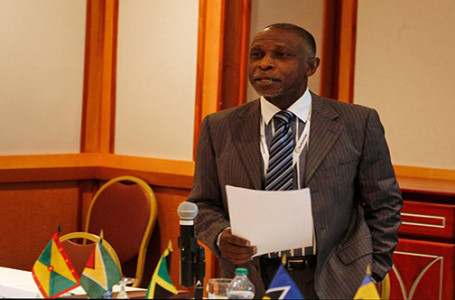
GEORGETOWN, Guyana (AFP) – Tensions soared in Guyana Saturday, after Venezuela declared its territorial seas re-drawn to include an offshore area where a major oil deposit has been found.
Neighbouring Venezuela already claims two thirds of Guyana’s territory, from its eastern border over to the Essequibo River, in what has become Latin America’s largest territorial dispute.
Caracas also previously has engaged in disputes over territorial seas with its South American neighbours, since they too ultimately set out who is entitled to determine the fate of what mineral wealth.
Now Foreign Minister Carl Greenidge said he was preparing to summon Venezuela’s ambassador to ask her why Caracas has further extended its maritime boundary to include an offshore area precisely where the US oil giant, granted a concession by Guyana, recently found a huge oil deposit.<
“We shall be calling in the country’s ambassador to explain its meaning, and to voice our concern about this escalation of a long-running attempt to achieve by questionable means, what Venezuela has so far failed to achieve by internationally accepted legal and diplomatic approaches,” Greenidge told AFP.
Efforts to contact the Venezuelan Ambassador to Guyana, Reina Margarita Arratia Diaz, were not immediately successful.
The Guyanese Foreign Minister said his Ministry was examining the contents of a May 27, 2015 edition of Venezuela’s Official Gazette that states the coordinates of what is purportedly an extension of its maritime boundary with Guyana.
The Head of the Guyana Defence Force, Brigadier Mark Phillips would only say that the military and civilian authorities were studying the decree by Venezuela’s President Nicolas Maduro.
“That matter is being studied by now. It is being studied by the Foreign Affairs, it is being studied by everyone, all the main actors including the military. Everybody is paying attention to it,” he told AFP.
Former Guyanase Ambassador to Venezuela Odeen Ishmael said Caracas’ latest decree claims all the territorial waters within the 200 mile range and so blocks Guyana’s access to resources in that area of the Atlantic Ocean.
Unlike a first decree issued by Venezuelan President Raul Leoni in July 1968 that purportedly claims sovereignty over a 12-mile strip of Guyana’s continental shelf along the Essequibo Coast, this decree by Maduro takes in an oil-rich concession that Guyana has granted to US oil giant Exxon Mobil.
Prior to Exxon-Mobil’s announcement last month that it had found a “significant” oil deposit, Venezuela had twice written to the Guyanese subsidiary of that company warning it against continuing the search for oil because that maritime area and the entire Essequibo Region — the land area from Venezuela east to the Essequibo River — were part of its territory.
Back in September 2013, Venezuela’s Navy intercepted and arrested a seismic vessel that had been conducting tests in an offshore concession that Guyana granted to a Texas-headquartered company, Anadarko Petroleum Corporation.
Guyana maintains that an 1899 ruling settled the land border between the two neighbours. But Venezuela has insisted that the mineral and forest rich Essequibo Region is its territory, a claim that still is in the hands of the United Nations.
The 15-nation Caribbean Community, Commonwealth and the Organization of American States (OAS), have for several decades sided with Guyana, the only English-speaking nation in South America.
Thanks in part to low global oil prices, Venezuela is economic crisis; Maduro has increasingly centralized the economy, shortages are rampant and her faces falling approval ratings as his party moves toward midterm elections in coming months.
Bron: Jamaican Observer

